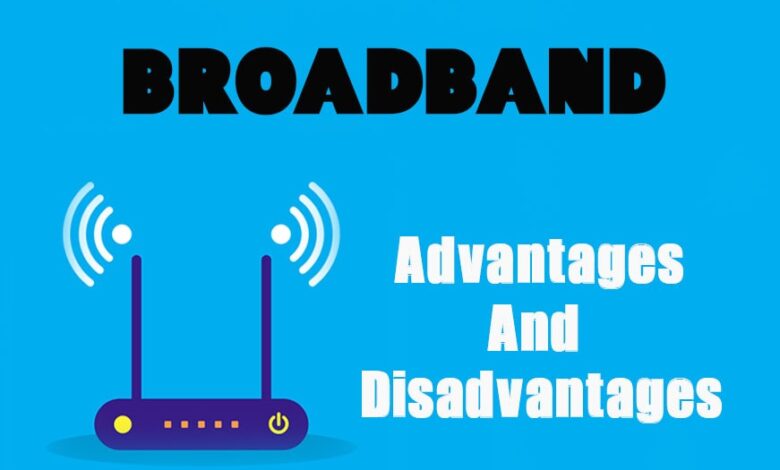Broadband and Internet Service Providers: Perks and Advantages

A broadband connection refers to a high-speed internet connection that provides users with fast and reliable access to the internet. Unlike traditional dial-up connections, broadband connections use advanced technology to provide faster speeds and more bandwidth so users can surf the web, stream media, and stream media without experiencing delays or buffering. You can download files, etc.
Broadband connectivity can be provided in many ways, including DSL, cable, fiber optics, satellite, and wireless technologies. Each of these methods has advantages and disadvantages, and the choice of which method to use depends on factors such as geographic location, cost, and speed requirements.
Broadband connectivity has grown in popularity in recent years in India, increasing the number of services the providers are offering to both home and business customers. From major cities such as Delhi and Mumbai to smaller towns and rural areas, broadband connectivity is helping to bridge the digital divide and enable people to access the vast resources available on the Internet.
Advantages of Broadband:
A broadband connection has several advantages, some of which are listed below.
- High speed internet: A broadband connection provides high-speed Internet access so you can surf the web, stream videos, and download files faster and more efficiently.
- More reliability: A broadband connection uses a dedicated line to connect to the Internet, making it more reliable and less likely to fail than other types of Internet connections.
- Multiple users: A broadband connection can be shared among multiple users, making it ideal for families, small businesses, and other organizations.
- More options: Broadband connections offer more options than other types of internet connections, with different speeds, plans, and packages to choose from.
- Increased productivity: A broadband connection with high-speed Internet access improves personal and business productivity by enabling faster file transfers, video conferencing, and more.
- Better entertainment: Broadband connections allow seamless streaming of movies, music, and other forms of entertainment, making them popular with users who need a reliable, fast connection for their entertainment needs.
Now if you’re wondering whether Broadband or Wi-fi would be better for you, let’s sort that out. Broadband connections tend to be faster and more reliable than Wi-Fi connections and are generally preferred for bandwidth-hungry applications such as: B. Video Streaming or Online Gaming. However, Wi-Fi is more flexible and convenient because it allows devices to connect to the Internet without being tied to a physical connection.
Choosing between broadband and Wi-Fi ultimately comes down to your specific needs and preferences. Broadband is best if you need a lot of bandwidth and reliability. However, if you value flexibility and convenience, Wi-Fi may be a better choice.
To get access to the Internet you will require an ISP or Internet Service Provider. An ISP (Internet Service Provider) is a company that provides customers with access to the Internet. This usually includes a monthly fee for a fixed amount of bandwidth. This determines the speed and amount of data you can send and receive over your Internet connection. ISPs use a variety of technologies to provide Internet access, including fiber optic cables, DSL lines, cable modems, satellite connections, and cellular networks. Some ISPs also offer additional services such as email hosting, web hosting, and VPN (Virtual Private Network) access. Overall, ISPs play a key role in connecting people to the Internet and enabling them to access the wide range of information, services, and applications available online.
An ISP is responsible for everything that will ensure internet connectivity in your place of choosing. The advantages of having an ISP are as follows:
- Reliable connection: ISPs provide always-on, reliable Internet connections, as opposed to slow, unreliable dial-up connections.
- High speed internet: ISPs provide high-speed internet, making browsing, downloading, and uploading files faster.
- Cost efficient: With the advent of ISPs, Internet access has become much more affordable and accessible to more people.
- Customizable package: ISPs offer a variety of customized packages to meet the specific needs of individual users.
- Technical support: ISPs provide users with technical support to solve Internet problems. Additional services:
ISPs often offer additional services such as email accounts, web hosting, and cloud storage.
Here is an overview of each ISP and their broadband plans in India.
- Airtel broadband: Airtel offers various broadband plans with speeds from 40Mbps to 1Gbps. Plans come in a variety of pricing options with different data caps and additional perks like Amazon Prime subscriptions and Netflix subscriptions.
- Jiofiber: Jio Fiber offers various broadband plans with speeds from 30Mbps to 1Gbps. Plans come in a variety of pricing options with different data caps and additional perks like Amazon Prime subscriptions, Netflix subscriptions, and free voice calls.
- BSNL Broadband: BSNL offers broadband plans with different speeds from 8Mbps to 100Mbps. Plans have different pricing options with different data caps and extra perks like free voice calls.
- ACT Fiber Network: ACT Fibernet offers a variety of broadband tariffs with speeds from 20 Mbit/s to 1 Gbit/s. Plans come in a variety of pricing options with different data caps and extra perks like free voice calls and Netflix subscriptions.
- Hathaway Broadband: Hathway offers various broadband plans with speeds from 50Mbps to 1Gbps. Plans come in a variety of pricing options with different data caps and additional perks like free voice calls and an Amazon Prime subscription. Spectrum:
Apart from the old players in the market, some new ISPs are also popping up to further intensify the competition in the market. Spectra is an Indian Internet Service Provider (ISP) that offers broadband services in major cities such as Delhi, Mumbai, Bangalore, Chennai, and Pune. Formerly called Spectra net, it was renamed to Spectra in 2019. Spectra’s broadband service is delivered over a fiber optic network that provides high-speed internet connectivity.
Spectra offers a variety of broadband plans with different speeds and data limits to meet customer needs. Popular plans include Spectra Fastest Basic, Spectra Fastest Select, Spectra Fastest Ultra, and Spectra Fastest Gigabit. Spectra also offers additional services such as Spectra Secure and Spectra Device Protection, which provide online security and electronic device protection respectively.
Spectra has a reputation for fast, reliable internet connections and responsive customer service. It has also won one of the prestigious awards of being the “Best Broadband Service Provider in India” at the Telecom Awards 2021.



